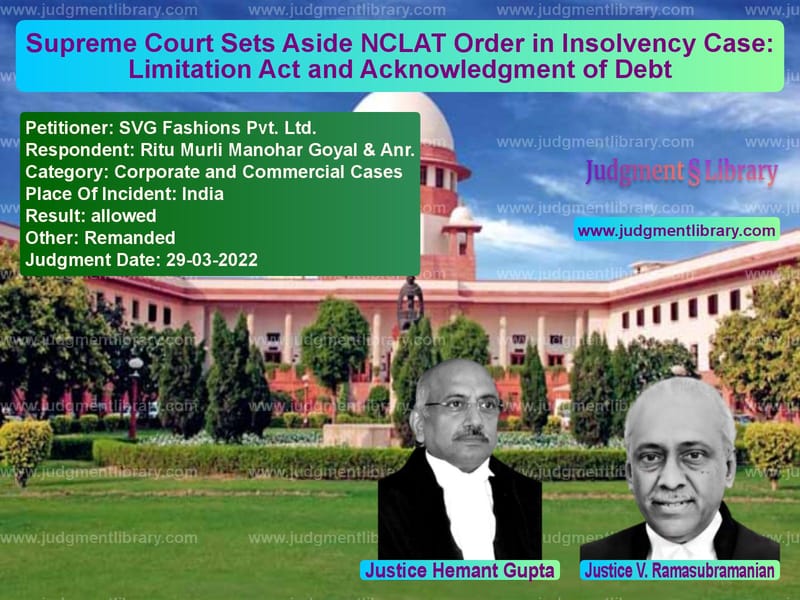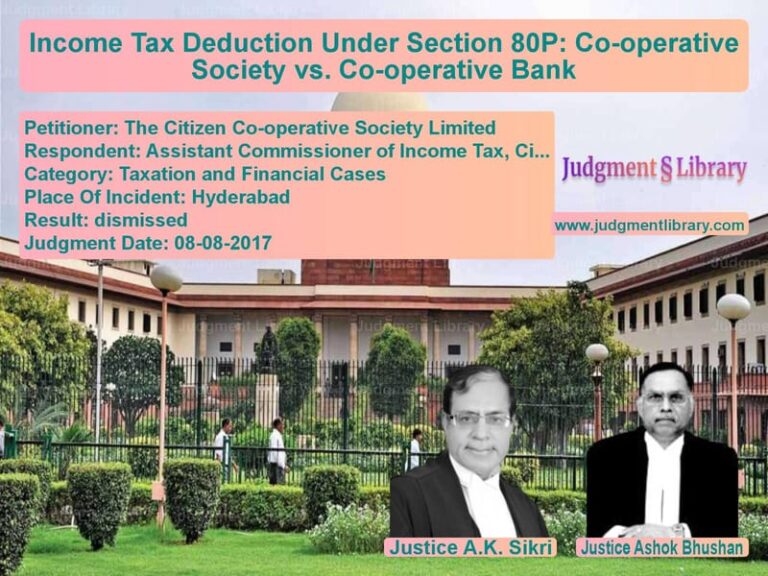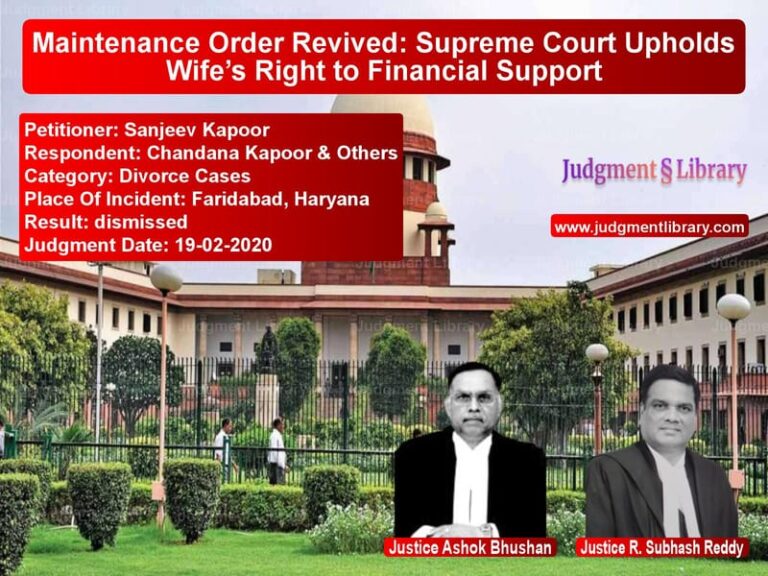Supreme Court Sets Aside NCLAT Order in Insolvency Case: Limitation Act and Acknowledgment of Debt
The case of SVG Fashions Pvt. Ltd. vs. Ritu Murli Manohar Goyal & Anr. is a significant ruling by the Supreme Court regarding the applicability of the Limitation Act in insolvency proceedings under the Insolvency and Bankruptcy Code, 2016 (IBC). The judgment clarifies the interpretation of acknowledgment of debt under Section 18 of the Limitation Act and its impact on the limitation period for initiating insolvency proceedings.
The appeal was filed by the operational creditor against the decision of the National Company Law Appellate Tribunal (NCLAT), which had reversed the National Company Law Tribunal’s (NCLT) order of admission under Section 9 of the IBC. The Supreme Court, upon review, found errors in the NCLAT’s analysis and remanded the matter for fresh consideration.
Background of the Case
The appellant, SVG Fashions Pvt. Ltd., filed an application under Section 9 of the IBC against the corporate debtor, M/S Arpita Filaments Pvt. Ltd., on April 20, 2018, claiming unpaid dues arising from business dealings that commenced in 2013. The operational creditor alleged:
- The corporate debtor purchased and received various fabrics but failed to make timely payments.
- A demand notice was issued under Section 8 of the IBC, but no response was received.
- The corporate debtor had issued six post-dated cheques, which were dishonored upon presentation.
Proceedings Before NCLT
Before the NCLT, the corporate debtor raised the following objections:
- The claim was barred by limitation.
- The six cheques were lost by the corporate debtor in March 2017, and stop-payment instructions were issued.
- The letter dated September 28, 2015, relied upon by the operational creditor, was issued by another entity, Shree Adeshwar Textiles, and could not be used to extend the limitation period.
The NCLT, however, found that the cheques were issued as part of an acknowledgment of liability. Therefore, the application was within the limitation period, and the claim was admitted. A moratorium was also declared under Section 14 of the IBC.
NCLAT’s Decision
Upon appeal, the NCLAT reversed the NCLT’s decision, holding that:
- The debt arose between August 11, 2013, and September 2, 2013.
- The limitation period should have ended on October 7, 2016.
- The cheques issued in December 2017 could not save the limitation period.
The NCLAT, therefore, dismissed the operational creditor’s application, concluding that the claim was time-barred.
Supreme Court’s Observations and Verdict
The Supreme Court, in its ruling, found that the NCLAT had overlooked the significance of the letter dated September 28, 2015, which referenced the cheques. The Court noted:
- The six cheques mentioned in the letter matched the details of the cheques allegedly lost by the corporate debtor.
- The corporate debtor’s director, in his affidavit, acknowledged that their banker had recorded a stop-payment instruction on March 4, 2017, but the bank’s system mistakenly recorded the date as January 1, 2018.
- The NCLAT failed to consider the settled principles of law under Section 18 of the Limitation Act regarding acknowledgment of debt.
Legal Precedents Considered
The Supreme Court referred to multiple cases concerning the applicability of Section 18 of the Limitation Act:
- Jignesh Shah vs. Union of India (2019): Held that once limitation starts running, it can only be extended as per the Limitation Act.
- Babu Lal Vardharji Gurjar vs. Veer Gurjar Aluminium Industries (2020): Clarified that Section 18’s reference in Jignesh Shah was illustrative and did not modify existing legal principles.
- Asset Reconstruction Co. vs. Bishal Jaiswal (2021): Held that even an entry in a balance sheet could constitute an acknowledgment of debt.
Supreme Court’s Decision
Based on these legal principles, the Supreme Court held that the NCLAT’s failure to examine the acknowledgment of debt vitiated its order. Consequently, the Court:
- Allowed the appeal.
- Set aside NCLAT’s order.
- Remanded the case to the NCLAT for fresh consideration.
The judgment reinforced that acknowledgment of debt under Section 18 of the Limitation Act can extend the limitation period and must be carefully examined in insolvency cases.
Impact of the Judgment
This ruling has significant implications for insolvency proceedings under the IBC:
- It clarifies that acknowledgment of debt can be made through various means, including letters, cheques, and balance sheets.
- The decision underscores the importance of carefully analyzing limitation issues before rejecting insolvency applications.
- The judgment serves as a precedent for similar cases where operational creditors rely on past acknowledgments to prove the validity of their claims.
By setting aside the NCLAT’s order, the Supreme Court reaffirmed the importance of adhering to well-established legal principles in insolvency disputes.
Petitioner Name: SVG Fashions Pvt. Ltd..Respondent Name: Ritu Murli Manohar Goyal & Anr..Judgment By: Justice Hemant Gupta, Justice V. Ramasubramanian.Place Of Incident: India.Judgment Date: 29-03-2022.
Don’t miss out on the full details! Download the complete judgment in PDF format below and gain valuable insights instantly!
Download Judgment: svg-fashions-pvt.-lt-vs-ritu-murli-manohar-g-supreme-court-of-india-judgment-dated-29-03-2022.pdf
Directly Download Judgment: Directly download this Judgment
See all petitions in Bankruptcy and Insolvency
See all petitions in Judgment by Hemant Gupta
See all petitions in Judgment by V. Ramasubramanian
See all petitions in allowed
See all petitions in Remanded
See all petitions in supreme court of India judgments March 2022
See all petitions in 2022 judgments
See all posts in Corporate and Commercial Cases Category
See all allowed petitions in Corporate and Commercial Cases Category
See all Dismissed petitions in Corporate and Commercial Cases Category
See all partially allowed petitions in Corporate and Commercial Cases Category







